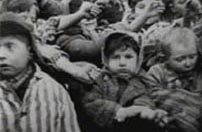
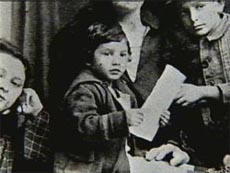 | Survivors explain their perception
of Hitler's early threats.
28.8 | 56 | Cable/T1
|
|
Witness: Voices from the Holocaust.. Video. 86 minutes. Joshua M. Greene and Shiva Kumar, producers. Stories to Remember, in association with the Fortunoff Video Archive for Holocaust
Testimonies, Yale University. 1999. For more information on the video and its companion book, Witness: Voices from the Holocaust, Greene, Joshua M. & Shiva Kumar, Editors, Free Press, 288 pp., go to: http://www.strmedia.com/witness/index.html.
The outpouring of survivors' testimonies
in the past generation has enriched the study of the Holocaust immensely.
When participants are able to tell their own stories they can animate
history as nothing else can. That so many articulate people survived
to write memoirs or to describe their experiences to students, filmmakers,
and archivists is one reason that the subject has captured the public
imagination in the United States and much of Europe. The scholarly implications
of the popularity of these testimonies are increasingly clear, however.
Not only are fakes occasionally unmasked, such as Binjamin Wilkomirski's
Fragments: Memoirs of a Wartime Childhood, which won the 1996
National Jewish Book Award for Autobiography and Memoir. But these testimonies
may also come to dominate the field, with confused or conflicting accounts
opening the way for Holocaust deniers to cast doubt on their validity.
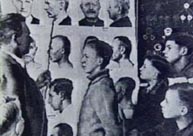 |
Frank S. describes the teaching
of "Racial Science" in 1930's Germany.
28.8
|
56 |
Cable/T1 |
|
Filmmakers must address these concerns when
using survivors' accounts. Usually, they have been incorporated into a
traditional documentary format, along with voice narration, archival and
contemporary footage, and interviews with experts on the subject. The
Fatal Attraction of Adolf Hitler, the 1989 BBC documentary (reviewed
in The Journal for MultiMedia History, Volume 2, 1999), is one
widely praised example of this genre, covering a broad sweep of history.
Most films take a more limited subject, such as the "Night of Broken Glass"
or partisan warfare in Vilna, and use testimony—usually in translation—as
one element in the story they are telling.
Joshua Greene and Shiva Kumar have chosen
a bolder approach in Witness: Voices from the Holocaust. Drawing
on the Fortunoff Video Archives at Yale University, which since 1979 has
collected testimonies of some four thousand survivors, they present nineteen
eyewitnesses speaking in English, with no narrator, experts, or translators
standing between them and their audience. The survivors are articulate
and the viewer sees enough of them as they appear from time to time or
their voices are heard while archival film is on the screen to be moved
by their stories. Most of the nineteen are Jewish, but they also include
a former American POW in a German camp, another American who took part
in the liberation of a camp, a former Hitler Youth member, and a priest
who witnessed deportations. The result is a powerful, effective, and award-winning
film, aired nationally by PBS in May, 2000, as well as a companion book
with a foreword by the distinguished scholar Lawrence L. Langer. It, too,
has drawn wide accolades.
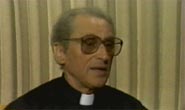 |
Father John S., a Czech priest,
describes the "collective crime"
of
indifference and fear of denunciation.
28.8 | 56 | Cable/T1
|
|
Greene and Kumar are television producers with a long string
of credits, chiefly in producing animated and live-action films for children.
In interviews he gave after making Witness, Greene made it clear
that he had not read much about the Holocaust during the four years he
spent on the film and book. He tried instead to let the testimony speak
for itself, to "step away from the control inherent in his craft as a
filmmaker, relinquish the expectations that accompany interviews."[1] Witness
may succeed in these terms and even awaken the interest of schoolchildren
in the subject—which would be no small accomplishment—but it
also raises a number of questions of particular concern to scholars.
Scholars may be irritated by some of the
choices the filmmakers made. Why was an American POW chosen as a "voice
from the Holocaust" but not a Romany or Polish person? Simply because
the Fortunoff Video Archive has his testimony and not theirs? How representative
are the survivors and how accurate are their statements? Is Robert S.,
the former Hitler Youth member, correct in saying that Germans were all
in favor of war at the outset? Is Joseph K. fair in saying that the Polish
Nationalist Party fell under the influence of the Nazis? Were many American
prisoners of war put in places like Mathausen, as Herbert J. was,
rather than in POW camps?
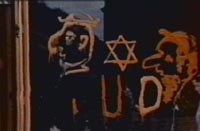 | Robert S., former
Hiter Youth member, asserts that
most germans
were for the war.
28.8 |
56
|
Cable/T1 |
|
Though I cannot ignore these questions, I believe
that the dramatic impact of Witness would have been seriously compromised
by a more conventional approach to the use of testimonies. A narrator
could have answered some questions, framed some issues differently, but
at a price. Scholars who work with survivors often stress how we can enlarge
our understanding of the Holocaust if we encourage them to express themselves
freely and avoid imposing our own categories and questions. Witness
is a beautifully wrought example of the directness and power that can
be achieved when survivors are allowed to tell their own stories.
What child could listen to Frank S. describe his
classroom experience without being moved? A Jewish child in a biology
classroom when "Racial Science" was being taught in 1930s Germany, he
was ridiculed by his teacher for his non-Aryan features. The hatred for
that teacher that has stayed with him for fifty years is palpable. The
terrible deportation journey in crowded cattle cars is handled beautifully,
with interwoven accounts of survivors and of Father John S., a Czech priest,
who watched the train roll by his town and described the "collective crime"
of indifference and fear of denunciation, as no one came to the aid of
their former neighbors.
Hollywood treatments of Nazi concentration camps
do not probe the depths of the human experience the way the testimonies
in Witness do. Emotions are raw and on the surface as people describe
what they went through or subjected others to. There is the testimony
of a survivor still haunted by the knowledge that he sent his little brother
to his death by steering him to the wrong line during the selection process.
Martin S. described how he trained himself to be brutal in order to survive
in Buchenwald. "I didn't care about anyone else." One woman describes
how hunger drove her to steal bread from a fellow prisoner. Herbert J.,
the American POW, describes the brutality of Nazi guards and the cannibalism
of Soviet inmates.
There are no tidy conclusions to Witness.
Martin S. returns to Poland looking for his family and finds only hostility
from his former neighbors. He and Renee H. explain what happened to them
when they made their way to the United States. No one wanted to hear about
their experiences; they chose to remain silent for a generation. Another
survivor ends Witness with a question: "Did we really learn anything?
I don't know."
Notes:
-
Joshua Greene on The Paula Gordon Show, "Survivors: Introduction." Go to:
(http://www.paulagordon.com/shows/greene/. [Return]
Donald Birn
University at Albany, State University
of New York
~ End ~
Video Review of Witness: Voices from the Holocaust
Copyright © 2000, 2001 by The Journal for MultiMedia
History
Comments | JMMH
Contents
|




